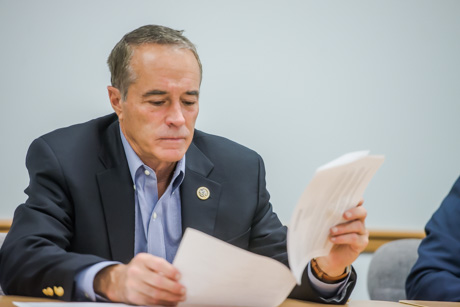Genesee County is outperforming many other municipalities in New York when it comes to getting the highest possible return on tax dollars, a financial consultant told members of the Legislature this week.
Over the past year, the county has earned almost $1.6 million by adroitly managing cash flows and placing cash reserves in investments with the best returns while minimizing risk and complying with state regulations.
With a $32 million tax levy, that return is about 4.77 percent, which means lawmakers can keep the property tax rate lower. If they wanted to generate an additional $1.6 million in property tax revenue, they couldn't do that without violating the state's tax cap.
The reason: "The county treasurer is willing to step out of the box and do whatever it takes to help the taxpayers," said Garrett Macdonald, a Genesee County resident who is vice president of Three+1, a financial consulting firm based in Pittsford.
Also, Macdonald said the county is "looking at data more intuitively and making sure that we're really looking under every stone to earn more. A lot of times (with) public entities, it's not the first priority to earn more on taxpayer dollars.
"The first priority is to make sure it's safe, to make sure that it's in deposit, that the money gets somewhere that it's recorded. And then budgeting is important. Treasury always is kind of a second priority.
"But in Genesee County's case, they're able to accomplish all the above. So looking at data, working with their banks, really putting treasury and earnings at the top of the priority list, along with safety, legality, liquidity."
Because there is money coming in before it's needed for public services, and because the county is required to maintain a cash reserve, there is always cash on hand.
What a government agency can do with it is regulated by the state, and among the things the county can do is buy treasury bills -- place it in money market accounts or certificate of account registries, or other safe and liquid investment vehicles. There are about seven options in total.
Treasurer Scott German spends time every week looking at the data and working with Macdonald on what the county's portfolio should look like based on market conditions and cash flow needs.
"I want to get the biggest return I can for the taxpayer," German said. "Therefore, using his information that he is able to provide, his negotiations with other banks, we are able to maximize the returns for the taxpayers.
"I mean, you compare me to probably any other county in the State of New York, I'm probably doing probably double or triple in interest rates, percentage-wise."
Macdonald said the county's return is well above the 1.5-percent benchmark local agencies should try to achieve, and that most municipalities struggle to get a 1-percent return.
There's one government agency, he said, that has a tax levy $26 million higher than Genesee County's and is generating $600,000 in investment income, less than half of what Genesee County is generating. And that's the next largest total dollar return in the comparison group.
"The biggest point that I will hone in on again and just reiterate: our goal is to maximize the value that the public creates through tax dollars," Macdonald said. "If we can do that through generating new revenues, that doesn't include increasing taxes, that's a big win."
Among economists, there has been a lot of talk about the inverted yield curve (a graph tracking returns on long-term and short-term bonds; when the economic outlook is good, long-term rates are higher than short-term rates; when the curve inverts, it's a sign investors have lost confidence in long-term returns). The curve inverted last quarter, which is a possible sign of a coming recession.
Macdonald believes the bond markets are correcting and he doesn't see a recession on the two-year horizon (in the past, when the yield curve has inverted, there has been a recession within 18 months). That said, if there is a recession in the next year, because of the money management practices of German, Genesee County's funds should be protected.
Financial markets are always cyclical, Macdonald noted, which is why it's important to stay on top of what is going on every week.
"If we have a recession in two years, I think the impact is yet to be known because we don't have money invested for two years," Macdonald said. "The longest we have money invested for the county's about one year.
"But when I can tell you is, looking into 2020, even though rates have gone down three times -- once in July, once in September and then once in October -- it's because we've been proactive and because Scott's been proactive at investing early before those decreases.
"We're still going to beat benchmarks going into 2020. So, where most counties are being reactive, Genesee County is proactive."

